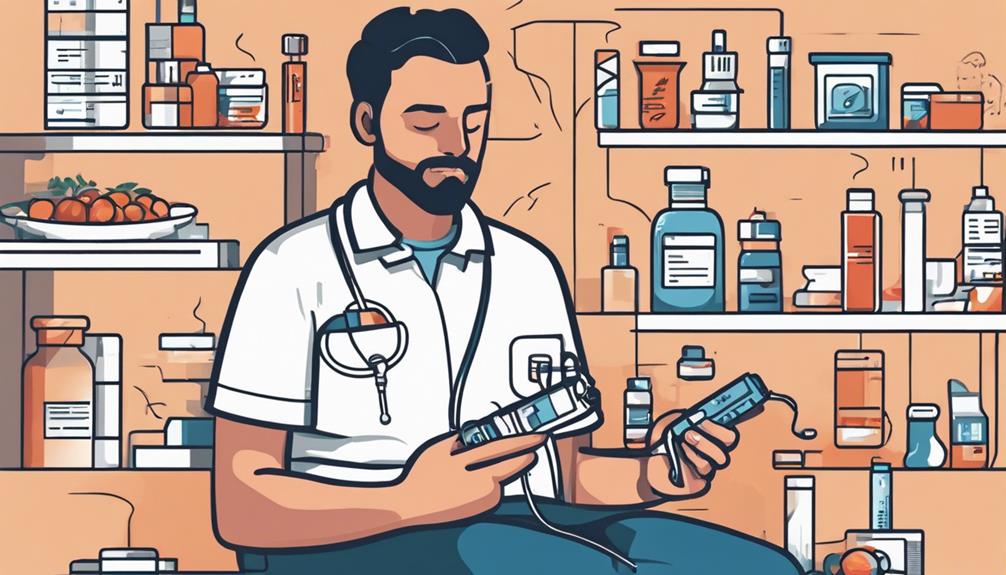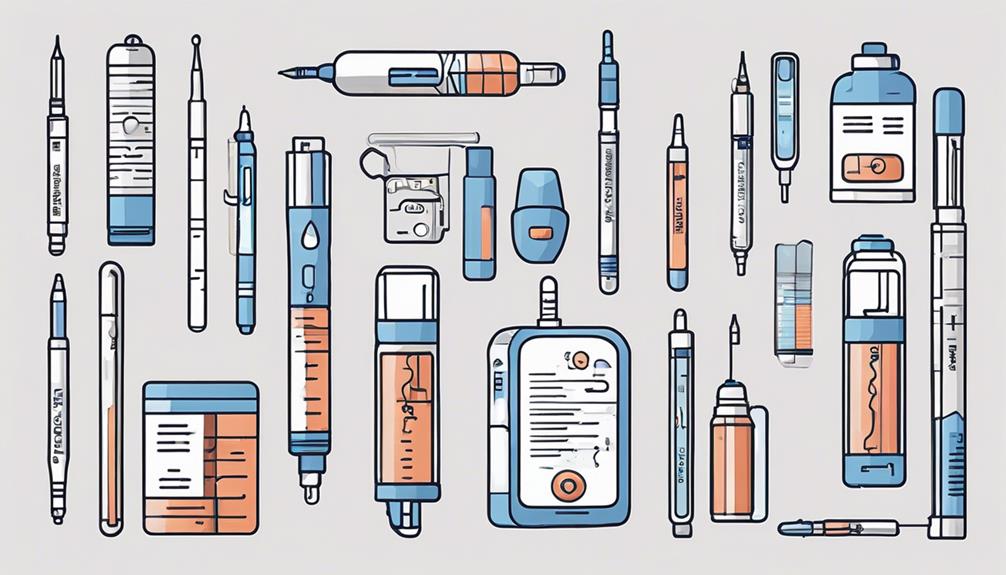Did you know that approximately 1.6 million people in the United States have type 1 diabetes, a condition that requires lifelong management?
Understanding how insulin therapy plays a crucial role in the treatment of this disease is essential for maintaining optimal health.
From the basics of insulin therapy to the various types of insulin available, exploring the intricacies of this treatment approach can provide valuable insights into effectively managing type 1 diabetes.
Key Takeaways
- Different types of insulin are essential for managing blood sugar levels effectively.
- Timing insulin doses with meals is crucial for controlling glucose levels.
- Collaboration with healthcare providers is key for successful insulin therapy in Type 1 diabetes.
- Monitoring blood sugar regularly helps in adjusting insulin doses and maintaining stable levels.
Understanding Insulin Therapy Basics

To effectively manage your type 1 diabetes, understanding the basics of insulin therapy is crucial. Insulin therapy involves using insulin to control blood sugar levels in your body. The main goal is to mimic how your body naturally produces and uses insulin to keep your blood sugar within a healthy range. There are various treatment options available for insulin therapy, including rapid-acting, short-acting, intermediate-acting, and long-acting insulin. Each type of insulin has a different onset, peak time, and duration, allowing for customizable treatment plans based on your needs.
Basics overview of insulin therapy includes the importance of timing your insulin doses with your meals and monitoring your blood sugar levels regularly. It's essential to work closely with your healthcare provider to determine the right type of insulin and dosage for you. Understanding the treatment options will help you make informed decisions about managing your type 1 diabetes effectively. Remember, proper insulin therapy is key to living a healthy and balanced life with diabetes.
Types of Insulin for Treatment
When considering treatment options for type 1 diabetes, various types of insulin play a crucial role in managing blood sugar levels effectively. Here are some key insulin types and a brief comparison:
- Rapid-Acting Insulin: Starts working within 15 minutes, peaks in about an hour, and lasts for 2 to 4 hours.
- Short-Acting Insulin: Begins working within 30 minutes, peaks in 2 to 3 hours, and lasts for 3 to 6 hours.
- Intermediate-Acting Insulin: Onset is 2 to 4 hours, peaks in 4 to 12 hours, and lasts for 12 to 18 hours.
- Long-Acting Insulin: Slow and steady release over 24 hours with no peak time.
- Ultra-Long-Acting Insulin: Steady release over 24 hours with a more consistent action profile.
Utilizing insulin pumps can also offer significant benefits for individuals with type 1 diabetes, providing precise insulin delivery and flexibility in managing blood glucose levels throughout the day.
Insulin Delivery Methods

Insulin delivery methods encompass a range of techniques that facilitate the administration of insulin to individuals with type 1 diabetes. Two common methods include injection pens and pump therapy. Injection pens are pre-filled devices that allow for easy and accurate insulin dosing. They're convenient for on-the-go use and discreet administration. On the other hand, pump therapy involves the use of continuous glucose monitoring systems paired with insulin pumps. These pumps deliver insulin continuously throughout the day, closely mimicking the function of a healthy pancreas.
Continuous glucose monitoring systems provide real-time data on blood sugar levels, enabling precise insulin dosing adjustments. Insulin pumps offer flexibility in dosing schedules and can deliver different types of insulin as needed. They're especially beneficial for those who require varying insulin doses throughout the day. Understanding these insulin delivery methods can help individuals with type 1 diabetes effectively manage their condition and lead a more balanced lifestyle.
Factors Affecting Insulin Dosing
Factors influencing the appropriate dosing of insulin in individuals with type 1 diabetes include metabolic rate, physical activity levels, and dietary intake. When determining insulin dosages, it's crucial to consider these factors to ensure optimal blood sugar control.
Here are some key points to keep in mind:
- Meal Timing: The timing of meals plays a significant role in insulin dosing. Insulin requirements may vary depending on when you eat, as different times of the day can affect how your body processes glucose.
- Physical Activity: Engaging in physical activity can impact insulin sensitivity. Adjusting your insulin dosages based on your activity levels can help prevent hypoglycemia or hyperglycemia.
- Metabolic Rate: Your metabolic rate influences how quickly your body processes insulin. Understanding your metabolism can aid in determining the appropriate insulin doses.
- Dietary Intake: The types and amounts of food you consume affect insulin requirements. Monitoring your carbohydrate intake and making adjustments accordingly is essential.
- Consistency: Maintaining a consistent routine with meal timing, physical activity, and insulin dosing helps stabilize blood sugar levels.
Monitoring Blood Sugar Levels
Monitoring blood sugar levels is essential for individuals with type 1 diabetes to track their glucose levels accurately and make informed decisions regarding their insulin therapy. Continuous glucose monitoring (CGM) systems provide real-time data on blood sugar levels, allowing for better management of diabetes. These devices use sensors placed under the skin to measure glucose levels continuously throughout the day and night, providing valuable insights into trends and patterns that traditional fingerstick tests may miss.
Carb counting is another crucial aspect of monitoring blood sugar levels for individuals with type 1 diabetes. By keeping track of carbohydrate intake, people can better match their insulin doses to the food they eat, helping to maintain stable blood sugar levels. Understanding how different foods affect blood sugar levels is key to achieving optimal glucose control.
Frequently Asked Questions
Can Insulin Therapy for Type 1 Diabetes Be Used in Conjunction With Other Medications or Treatments?
You can explore various combination therapies to manage type 1 diabetes effectively. Alternative treatments may also complement insulin therapy. Consult with your healthcare provider to discuss personalized options that suit your needs and lifestyle.
Are There Any Potential Long-Term Side Effects of Insulin Therapy for Type 1 Diabetes?
When considering long-term complications of insulin therapy for type 1 diabetes, it's important to recognize risk factors and potential issues. Lifestyle modifications and regular monitoring can help manage these risks effectively and ensure your health remains a top priority.
How Does Exercise and Physical Activity Impact Insulin Therapy for Type 1 Diabetes?
When you engage in exercise and physical activity, your insulin therapy for type 1 diabetes needs may change. Monitoring your blood sugar levels closely, staying hydrated, and adjusting your insulin doses accordingly are key to managing these challenges and benefiting from the positive effects of exercise.
Are There Any Specific Dietary Guidelines That Need to Be Followed While on Insulin Therapy for Type 1 Diabetes?
When on insulin therapy for type 1 diabetes, meal planning is crucial. Focus on carbohydrate counting to manage blood sugar levels effectively. It's essential to follow specific dietary guidelines to support your insulin regimen and overall health.
Can Insulin Therapy Be Adjusted During Illness or Periods of Stress for Individuals With Type 1 Diabetes?
When you face illness or stress, adjusting insulin dosage is crucial for managing type 1 diabetes. Stress can impact blood sugar levels, so monitoring closely and working with your healthcare provider is essential for effective stress management.
Conclusion
In conclusion, insulin therapy is a crucial aspect of managing type 1 diabetes. By understanding the basics of insulin treatment, utilizing different types of insulin, selecting appropriate delivery methods, considering various factors affecting dosing, and monitoring blood sugar levels regularly, individuals can effectively control their diabetes.
Just like a well-oiled machine, proper insulin therapy keeps the body running smoothly and in balance, ensuring a healthier and happier life for those with type 1 diabetes.